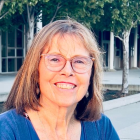Support strong Canadian climate journalism for 2025
These in-their-own-words pieces are told to Patricia Lane and co-edited with input from the interviewee for the purpose of brevity.
Jennifer Hong gives forests a human face.
This 26-year-old Vancouverite works for the Canadian Forest Service providing information and analysis on the potential economic interfaces between humans and forests. She also conceived, founded and runs Faces of Forestry, launched at the United Nations’ XV World Forestry Congress 2022, to allow youth to tell their own stories about what forests mean to them.

Tell us about your project.
Forests are often siloed as a separate interest, but humans seem to understand intuitively how important they are to so many aspects of our lives. If we can link forests to our own stories, they will be invested with the meaning we need to provide better care for these ecosystems that are the lungs of our planet, clean the air we breathe, host critical biodiversity and provide decent work and essential products for so many of us.
Faces of Forestry, a project of Youth4Nature supported by the United Nations Food and Agriculture Organization, provides a platform for young people to help each other and the world understand more about their relationships with forests wherever they live. At the time of the congress, we had 20 such stories told in different media. We hope there will be many more as other young people come forward to use this link to add their voices.
Are there any common themes across the stories?
Many describe entering a forest as “coming home." This is remarkable since so many of us live, work or study in cities. If we have access, forests allow us to manage stress and people often describe time in them as an important part of their mental health care. Those of us who understand forests as ecosystems point to the diverse economic and health-care opportunities they provide.

How did you come to create this project?
As an official youth delegate at COP26, I realized discussions about the need to conserve forests were too often focused on just tree planting and carbon sequestration. Tree planting is necessary, but it may not be secure work. Carbon sequestration is vital, but often involves largely leaving forests alone. Those who see forests through an industry lens tend to only imagine resource extraction jobs, which employ mostly men.
I found myself in the Korea Pavilion and learned it was hosting the XV World Forestry Congress. I wanted to make sure congress delegates understood that young people see forests as so much more. Sustainable forest management enriches communities and provides great jobs for diverse groups of people.
When I was in university, a professor remarked, “We are all a collection of our stories.” This resonated for me. I know we need both facts and stories to move people. I thought if we could bring young people’s stories to the congress, perhaps it would broaden the conversation.
The project allowed young people who could not participate in the congress to be there in storied form. It also ensured more youth heard about the congress, which is not well covered in the media. I like to think that delegates were influenced by the passion in the stories from all over the world.
What is your paid work?
I work for the Canadian government as part of a team finding innovative ways to generate economic benefit from using wood that would otherwise be wasted. Examples might be replacing the burning of diesel with sustainably harvested wood pellets or encouraging community-based harvesting of ecosystem-generated products like berries and mushrooms.

What do you see if people are connected to forests in a meaningful way?
Forests will be seen as ecosystems playing a crucial part in ensuring our planet is a safe and healthy home.
How did you get interested in forestry?
I was headed for medical school, but due to an administrative error, I was placed in a forest sciences program rather than the traditional pre-med stream. Since it was not a disadvantage to my chances, I was content to stay. One of my professors was so passionate about trees and the way they function that I fell in love with the field. The community of people engaged in forestry is energized and committed and I felt welcomed and at home.
As a first-generation Vietnamese-Canadian, I was raised with a strong ethic of care and giving back. I was happy to discover this way to care for people and my community.

Do you have any advice for other young people?
Greta Thunberg and David Suzuki both started with small steps. Start small in your own community. You do not have to be a big name to make a difference. It all matters and you never know who you will meet along the way or whose life you will improve because you began.
What would you like to say to older people?
Try having the youth panellist go first rather than be the footnote at the end. Ask who is not at the table. We have lots of energy, but we value it when you make room for us.







Comments
No doubt better than burning diesel in some communities, but burning instead biomass (wood "waste") still creates terrible pollution. Wood smoke is pollution. And the advertising industry who deify wood fires in every third tv commercial perpetuate the ignorance. You'd think with the rise in forest fires and communities being choked out that people would begin to get the connection Even a single backyard wood fire in a fire pit can easily blanket an entire neighbourhood in PM 2.5 and a cocktail of chemicals. And don't anyone kid themselves that burning wood is "carbon neutral". As a society we need to re-think our love affair with wood burning.